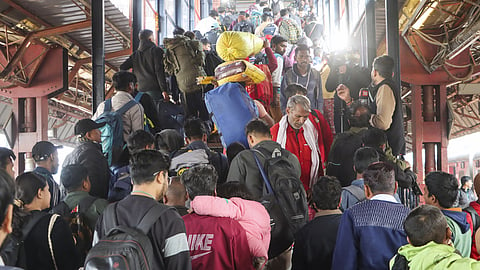

NEW DELHI: The Delhi High Court on Wednesday issued notices to the Union government, Indian Railways, and the Railway Board following a stampede at the New Delhi railway station, seeking immediate implementation of safety measures to prevent such tragedies in the future.
The stampede unfolded around 10 pm on February 15 when thousands of passengers, predominantly Maha Kumbh devotees, rushed to platforms 14 and 16 due to a misleading announcement of two trains travelling to Prayagraj. 18 people died and more than a dozen were injured in the incident, sparking serious concerns regarding overcrowding and mismanagement at railway stations.
The matter is scheduled for further hearing on March 26.
During the hearing of a Public Interest Litigation (PIL) filed by Arth Vidhi, an organisation of legal and business professionals, the Division Bench comprising Chief Justice DK Upadhyay and Justice Tushar Rao Gedela sharply criticised the Indian Railways’ practice of overselling tickets beyond train’s capacity.
“If there’s a fixed limit on the number of passengers in a coach, why is the ticket sale exceeding that limit? This is a fundamental problem,” the Court remarked.
Citing Section 57 of the Railways Act, which mandates that each coach must have a fixed maximum capacity, the Court pointed out that the provision was being disregarded.
“A straightforward adherence to this rule could have prevented this disaster. During peak times, the Railways could make adjustments, but there has to be a limit,” the Court stressed.
Advocate Aditya Trivedi, representing the petitioners, strongly condemned the Railway administration’s negligence, arguing that the stampede was a result of systemic failure.
“This catastrophe is not an accident—it’s the direct consequence of mismanagement, recklessness, and a blatant disregard for safety regulations,” he asserted.
Justice Gedela, however, pointed out that immediate measures had been taken post-tragedy.
“Given the sheer number of people at the station that day, controlling such a crowd might not have been feasible. It’s not a railway accident but an issue of managing an unforeseen rush,” he observed.
The petitioner’s counsel countered by emphasising the lack of crowd control mechanisms in Indian Railways compared to other transport hubs.
“Airports have systems to track the number of people present. Why doesn’t the Indian Railways? There is no structured regulation for unreserved ticketing. If the Railways fails to follow its own rules, how can we expect passenger safety?” he questioned.
Highlighting another loophole, he pointed out that large numbers of people access platforms without tickets, violating existing regulations.
“If platform ticket requirements were enforced properly, the congestion could have been significantly reduced. This isn’t about infrastructure; it’s about compliance,” he stressed.
Acknowledging the seriousness of the issue, Solicitor General Tushar Mehta, appearing for the Indian Railways, assured the Court that the matter would be examined.
“The law already exists, and we are bound by it. No additional directives are needed for us to follow our obligations,” he stated.
Regarding the demand for structured unreserved ticket issuance, Mehta mentioned that guidelines had been issued but admitted to country-specific challenges.
“Certain people, especially from economically weaker sections, tend to gather in large numbers. We do face unprecedented situations during rush hours, but the Railway Board will look into the concerns raised,” he assured.
On compensation for the victims’ families, Mehta reiterated that it had already been provided but admitted that no monetary relief could truly compensate for the loss of lives.
“We recognise the tragedy. However, implementing new regulations or infrastructure changes requires time and practical considerations,” he stated.
Summing up the discussions, Chief Justice Upadhyay noted that the PIL raised valid concerns.
“The petitioner’s argument is not just about this one incident but about ensuring that such disasters do not happen again due to non-compliance with existing rules. There should be no resistance to these demands,” he asserted.
The Court has directed the Railway Board to submit a detailed affidavit outlining the measures it will implement to prevent similar tragedies.
“You must take action, but those actions should be adequate,” the Court remarked while seeking a formal response.